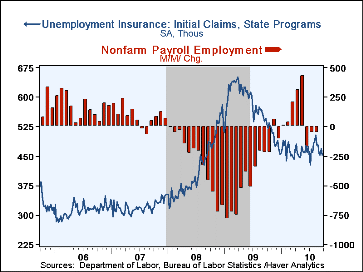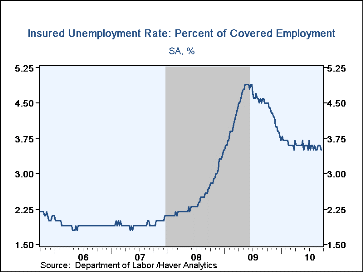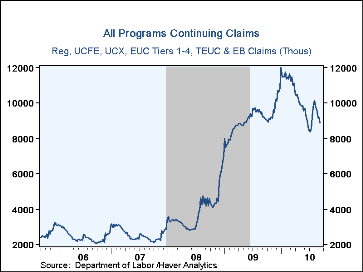 Global| Sep 30 2010
Global| Sep 30 2010Initial Claims For Jobless Insurance Slip, But Total Claimants Fall Sharply
by:Tom Moeller
|in:Economy in Brief
Summary
Initial claims for unemployment insurance fell 16,000 last week to 453,000 from an upwardly revised 469,000 in the week prior (originally 465,000).The 4-week moving average fell slightly to 463,250. The latest weekly decline was [...]
 Initial claims for unemployment insurance fell 16,000 last week to
453,000 from an upwardly revised 469,000 in the week prior (originally
465,000).The 4-week moving average fell slightly to 463,250. The latest weekly
decline was greater than Consensus forecasts for a decline to 458,000.
During the last ten years there has been a 78% correlation between the
level of initial unemployment insurance claims and the m/m change in
payroll employment.
Initial claims for unemployment insurance fell 16,000 last week to
453,000 from an upwardly revised 469,000 in the week prior (originally
465,000).The 4-week moving average fell slightly to 463,250. The latest weekly
decline was greater than Consensus forecasts for a decline to 458,000.
During the last ten years there has been a 78% correlation between the
level of initial unemployment insurance claims and the m/m change in
payroll employment.
Continuing claims for state-administered programs fell slightly to 4.457M during the week of September 18 while the associated unemployment rate slipped to 3.5% from an upwardly revised 3.6%. These claimants are, however, only about half of the total number of people currently receiving unemployment insurance. Regular extended benefits, with eligibility dependent on conditions in individual states, fell sharply to 913,113 on September 11, the latest available figure and still near the series' high. In July, the Congress renewed the special Emergency Unemployment Compensation program referred to as EUC 2008. By September 11, also the latest available for this program, it had 3.966M beneficiaries. It will now accept claims through November 30 and will be continuing to pay out benefits until April 30, 2011.
Haver Analytics calculates a grand total of all claimants for unemployment insurance. This series includes extended and emergency programs as well as selective programs for railway employees, recently discharged veterans and federal employees. All together, on September 11, the total number of recipients was 8.889M, off 4.0% y/y and down from the early-January high of 11.989M. These data are not seasonally adjusted.
Data on weekly unemployment insurance programs are contained in Haver's WEEKLY database and summarized monthly in USECON. Data for individual states, including the unemployment rates that determine individual state eligibility for the extended benefits programs and specific "tiers" of the emergency program, are in REGIONW, a database of weekly data for states and various regional divisions. Action Economics' Consensus forecasts for a collection of major economic indicators are contained in the AS1REPNA database.
How Should Monetary Policy Respond to a Slow Recovery? is the title of yesterday's speech by Boston Fed President Eric S. Rosengren and it is available here.
| Unemployment Insurance (000s) | 09/25/10 | 09/18/10 | 09/11/10 | Y/Y | 2009 | 2008 | 2007 |
|---|---|---|---|---|---|---|---|
| Initial Claims | 453 | 469 | 453 | -17.0% | 572 | 419 | 321 |
| Continuing Claims | -- | 4,457 | 4,540 | -25.8 | 5,809 | 3,340 | 2,549 |
| Insured Unemployment Rate(%) | -- | 3.5 | 3.6 | 4.6 (09/09) |
4.4 | 2.5 | 1.9 |
| Total Continuing Claims* (NSA) | -- | -- | 8.889M | -4.0% | 9.085M | 3.884M | 2.584M |
* Calculated by Haver Analytics, as the sum of regular state programs, extended benefits, federal employees, veterans, railroad retirement board and "EUC" 2000
Tom Moeller
AuthorMore in Author Profile »Prior to joining Haver Analytics in 2000, Mr. Moeller worked as the Economist at Chancellor Capital Management from 1985 to 1999. There, he developed comprehensive economic forecasts and interpreted economic data for equity and fixed income portfolio managers. Also at Chancellor, Mr. Moeller worked as an equity analyst and was responsible for researching and rating companies in the economically sensitive automobile and housing industries for investment in Chancellor’s equity portfolio. Prior to joining Chancellor, Mr. Moeller was an Economist at Citibank from 1979 to 1984. He also analyzed pricing behavior in the metals industry for the Council on Wage and Price Stability in Washington, D.C. In 1999, Mr. Moeller received the award for most accurate forecast from the Forecasters' Club of New York. From 1990 to 1992 he was President of the New York Association for Business Economists. Mr. Moeller earned an M.B.A. in Finance from Fordham University, where he graduated in 1987. He holds a Bachelor of Arts in Economics from George Washington University.
More Economy in Brief
 Global| Feb 05 2026
Global| Feb 05 2026Charts of the Week: Balanced Policy, Resilient Data and AI Narratives
by:Andrew Cates








